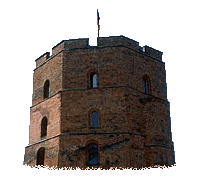

Posted by Wayne Parham [ 64.216.178.13 ] on August 15, 2005 at 12:06:53:
In Reply to: The Occult and Nazism posted by Damir on August 15, 2005 at 10:01:28:
You were right to bring up the point of the Nazi propoganda machine. They are a great example, because their fabrications were so exaggerated it made the falsehoods easy to see. It is also interesting to me, though, how easy it was for them to sell to their population. But it wasn't the Nazi's fascination with spiritual or occult matters that troubled me so much as their propensity to distort facts, to fabricate stories and try to rewrite history. That's the part that's disturbing.
I think the texts found at Qumran are very interesting. That's one thing, and the false histories like the Priory of Sion are another. One is historical fact, the other a fabrication. I just think the facts are interesting enough without resorting to some sort of embellishment or fabrication, like to buttress the story or something.
The texts such as the Gospel of Philip are an excellent example. It says that there existed a special relationship between Jesus of Nazareth and Mary of Magdala. I think it is natural that maybe when Jesus was walking through Magdala, they may have caught each other's eyes and been more than friends. One can only speculate, but with what is written in some of the texts found in Qumran, it would seem highly plausible.
If the truth is they were romantically involved, I don't see why that should be viewed as bad or heretical. If that is the truth, it's just like the Copernican model of the solar system - A surprise to those who thought otherwise but not something I would think should be threatening to any religious belief system.
But one can say all of this without any embellishment at all. The Priory of Sion fabrication isn't required in order to make the hypothesis that maybe Mary had a child. The study of actual writings of the day is more interesting than the fraud. So I guess I'm just wondering outloud, why did they do it?
That's my point here. There are accounts in actual writings of the era that make some startling revelations. Some of the Gnostic texts are very interesting, and while the early church found them heretical, I'm not sure they should have been. To tell the truth, I can't help but wonder if the Council of Carthage didn't put a lot of spin on things when they chose what should be cannonized and what wasn't. But it doesn't make it any better to spin things further in modern times, fabricating things to make a case.
Truth is truth. If you want to learn how to build an airplane, you must first understand the laws of physics, of gravity and aerodynamics. Alchemy doesn't do much good, neither does sorcery or any other hodge-podge pseudo-science. Then again, from the view of a person in 1000 AD, the flight would most certainly be seen as sorcery. Still, the thing is that truth is truth. The Nazis didn't lose the war because they were incapable, in fact, they were alarmingly capable. They lost the war because they constantly lied to themselves.
That's the whole point I'm trying to make. Not whether Gnostic teachings are right or wrong, not whether science is a religion or religion is a science, not whether there are secret truths in the books at Nag Hammadi. My point is that when people put spin on stuff, it's often the spin that is remembered more than the facts. Then you have years, sometimes decades or even centuries that the public memory is infected with a lie. Even if it isn't an intentional deception, and instead is just an entertaining story, sometimes the ideas interwoven in the public mind are as irrational as a flat earth where ships fall off if they get too near the edge.
[ Tower Forum ] [ Help ]